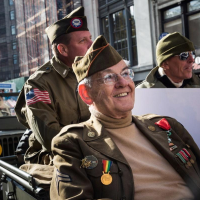For all the Problems at the VA, Veterans less Likely to feel Stress than Civilians
 Veterans Day Parade in New York City 2013 (photo: Andrew Burton, Getty Images)
Veterans Day Parade in New York City 2013 (photo: Andrew Burton, Getty Images)
Although significant numbers of veterans have had difficulty getting needed care at Department of Veterans Affairs (VA) facilities and some have had problems reintegrating into society after service in Iraq and Afghanistan, veterans as a whole report feeling less stress than civilians who haven’t served, according to a new Gallup poll.
The survey broke down respondents into two age groups, 18 to 44 and 45 to 64; and civilians, discharged veterans, retired veterans and active-duty service members. Discharged veterans are those who left the military for any reason prior to becoming eligible for a pension at 20 years of service.
Only 25% of active-duty service members in the older age group reported feeling stress during the previous day, the lowest number in the survey. On the other end of the scale, 46% of civilians and discharged veterans in the younger age group reported feeling stress on the previous day. Of younger retired vets, 42% felt stress as did 39% of younger active-duty service members. Among the older group, 40% of civilians, 36% of discharged vets and 32% of retired vets had felt stress on the previous day.
The report posits that veterans feel less stress because their military life taught them to carry on in the face of adversity. “What do I have to worry about back in the civilian world? A missed report, a client I failed to sign? The penalties for failure to perform in combat are far more severe,” said Gallup Senior Consultant David Goldich, a discharged veteran who served two tours in Iraq. “The military experience is defined by resilience. Your fellow troops are counting on you to perform under pressure at all times. Quitting is not an option.”
The numbers for whether respondents felt worry on the previous day came out similarly. Civilians had the highest worry rate, at 31% for the younger group and 30% for the older group. For discharged vets in both groups, 26% had felt worry and 20% of retired vets in both groups felt worry. Twenty percent of younger active-duty service members felt worry, while only 13% of older respondents on active duty did.
Those who have qualified for pensions and lifelong medical benefits, many at relatively young ages, would obviously feel more secure than those who haven’t, according to the survey.
The report concluded that in general, veterans are more emotionally resilient than those in the general population. It couldn’t be determined, however, whether the military attracted more emotionally sound people, or their service provided them with more resilience.
-Steve Straehley
To Learn More:
In U.S., Veterans Report Less Stress, Worry Than Civilians (by Justin McCarthy, Gallup)
VA Internal Report Confirms False Reports by Phoenix Office (by Noel Brinkerhoff and Danny Biederman, AllGov)
- Top Stories
- Unusual News
- Where is the Money Going?
- Controversies
- U.S. and the World
- Appointments and Resignations
- Latest News
- Musk and Trump Fire Members of Congress
- Trump Calls for Violent Street Demonstrations Against Himself
- Trump Changes Name of Republican Party
- The 2024 Election By the Numbers
- Bashar al-Assad—The Fall of a Rabid AntiSemite






Comments